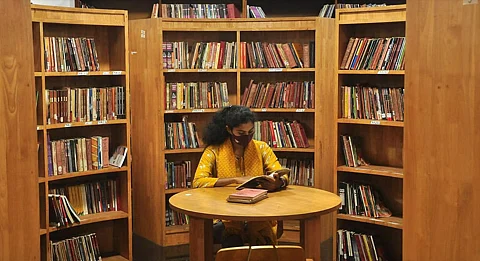

Libraries play a crucial role in not only fostering literacy and language development, but also are spaces for imagination, critical thinking, and lifelong learning. They create a resource rich environment, thereby addressing barriers to print access, faced by millions of children across the country.
By levelling the playing field, libraries bridge educational and social gaps by ensuring that knowledge and resources are equally accessible to all.
An increasing number of global studies have pointed to how access to library spaces in schools, with strong library programmes and wewell-trainedibrarians have the potential to impact a child’s academic performance and life trajectory.
The IFLA UNESCO Public Library Manifesto 2022 positions libraries as fundamental to education and democratic participation in society. NCF SE 2023 recognises the critical role of libraries by positioning them as curricular processes of language education. Although some mention of libraries is made in educational policies and their impact is acknowledged, a significant gap remains in the provision of well-functioning libraries in schools.
Schools must be well stocked with a rich collection of multilingual diverse children’s literature. They must shift away from didactic stories and represent universal themes and student’s lives, fostering a sense of belonging.
However, establishing a library, although a necessary condition, is not sufficient to generate reading interest or literacy outcomes. The next critical step is understanding how schools can foster meaningful engagement with these resources and create sustainable cultures of reading that extend beyond simply placing books in students' hands.
This asks us to relook at the idea of access and challenges the traditional notion of libraries as silent spaces.
Looking at libraries as “third space”, a term coined by Elmborg challenges the traditional notions of libraries and positions them as dynamic, social and cultural spaces that intersect between formal and informal learning.
This requires us to reimagine reading from an individual activity into a shared activity which is facilitated through social interactions like storytelling circles, read alouds, role plays, peer discussions, book exchanges and so on.
Such kinds of activities enable spaces for children to come together, share experiences and reflect to form empathy, mutual respect and a shared understanding of experiences. The role of adults in facilitating the space becomes critical for dialogue and shared reflections.
Libraries are not bound by rigid rules, relations of power and hierarchy as seen in typical classroom spaces, thereby providing a sense of freedom and self expression, which is often lacking in supervised environments.
When children are given the autonomy to move around, explore, browse through the shelves, make choices regarding what they want to read, not want to read, there is a sense of comfort and empowerment.
The pressure to perform academically or showcase specific learning outcomes is lifted from their shoulders. Instead, they can linger around, make choices, explore at their own pace and just be. This makes a library their space where they can dictate how, when, and what to explore.
By prioritising student agency, libraries can foster a love for reading and learning, transforming these spaces into vibrant hubs where they start discovering the joy of self-directed learning and growth.
The IFLA recommends a ratio of 1 library: 300 people, which would require India to have more than 4,66,000 libraries to serve its 1.4 billion population.
There is limited authentic data in terms of what exists in the library space, making it difficult to explore what needs to be done. Although certain studies have been conducted, large-scale systematic studies on the impact of libraries in Indian schools remain a significant gap.
The data below is a study conducted in Maharashtra and reveals a disappointing picture in terms of the number of librarians across India and Maharashtra.
Libraries are not supplementary spaces but essential learning hubs to ensure equity, acquire literacy and lifelong learning for all. Steps should be taken to strengthen the school and public library systems in the country. Every school must have uninterrupted access to well-stocked libraries, good library programs and the presence of trained teachers/ librarians.
Strengthening these foundations is an investment towards a more equitable and empowered society.
(Sanjana Chakraborty is a Teach For India alum. Views expressed are her own.)
